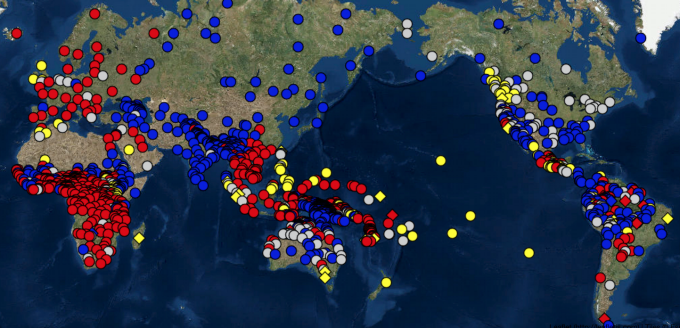Typology

Word order in the languages of the world. Image courtesy of the World Atlas of Language Structures
Linguistic typology is the study the ways in which the languages of the world vary in their patterns. It is concerned with discovering what grammatical patterns are common to many languages and which ones are rare. Typologists look at variation in all domains of grammar, including phonetics, phonology, morphology, syntax, and semantics. Typology is a very active research area of the Department of Linguistics, underlying the theoretical research on syntax, morphology, and semantics.
Core Researcheres
Jürgen Bohnemeyer, PhD specializes in semantic typology, the study of crosslinguistic variation and universals in the constraints languages impose on semantic representations. Semantic typology is a nascent field of inquiry that has grown out of the pioneering work by the cognitive anthropologists on color and kinship terminologies, ethnobiological classifications, and the expression of spatial concepts. At the center of Prof. Bohnemeyer’s research are constraints on the encoding of complex events.
Matthew S. Dryer, PhD has been working on a large typological database project since 1983. The database contains data on a variety of typological features for a set of currently over 1500 languages. This project has produced many publications, including 27 maps and chapters in the World Atlas of Language Structures (of which Prof. Dryer was one of the four editors), which was published by Oxford University Press in 2005. His typological research focuses on word order, grammatical relations, and methodological and foundational issues.
Jeff Good, PhD conducts typological research focusing on morphosyntactic typology, in particular typological variation in templatic constructions. He is also interested in the design and implementation of typological databases. His work on Niger-Congo languages takes on typological dimensions, with a particular emphasis on the diachronic typology of the family.
Robert D. Van Valin, Jr., PhD's work has concentrated on the typology of grammatical systems, looking at phenomena like the distribution and function of different types of voice oppositions and the interaction of focus structure and syntax in grammatical systems. This is related to his theoretical work in Role and Reference Grammar.